calsfoundation@cals.org
Hector (Pope County)
| Latitude and Longitude: | 35°27′47″N 92°58′45″W |
| Elevation: | 725 feet |
| Area: | 2.3 square miles (2020 Census) |
| Population: | (2020 Census) |
| Incorporation Date: | March 2, 1965 |
Historical Population as per the U.S. Census:
| 1810 | 1820 | 1830 | 1840 | 1850 | 1860 | 1870 | 1880 | 1890 | 1900 |
| – | – | – | – | – | – | – | – | – | – |
| 1910 | 1920 | 1930 | 1940 | 1950 | 1960 | 1970 | 1980 | 1990 | 2000 |
| – | – | – | – | – | – | 387 | 449 | 478 | 506 |
| 2010 | 2020 | ||||||||
| 450 | 411 |
The town of Hector is on Arkansas State Highway 27, about seventeen miles north of Atkins (Pope County) and just south of the Ozark-St. Francis National Forest. It has an elementary school and a high school that serve the children of northern Pope County.
One of the first settlements in Pope County was Boiling Springs, about a mile west of what became Hector. A large Methodist camp meeting was held at Boiling Springs early in the 1830s, while Arkansas was still a territory. After the meeting, a Methodist congregation was established at the site, led by five preachers: Mahlon Bewley and his sons John, Robert, George, and Nelson. A log building was constructed for the congregation in 1832. School classes were held in the church building and in the preachers’ homes.
After the Civil War, the population of the area shifted to the present location of Hector. This relocation may have been due to the flow of traffic through the area (now developed as Highway 27), but historical records are scant. A tannery was built there, followed by a whiskey distillery operated by the federal government. A doctor’s office, drugstore, and other businesses followed. Cotton was the primary crop of the area, and several cotton gins were built around Hector, one of which became the location of the school for a short time.
Henry Jefferson Mayo sought permission to operate a post office in his store. His proposed name for the post office was Avondale, remembering his hometown in Indiana. Because of political differences, the other residents opposed the name of Avondale and made several contrary suggestions. Federal officials tired of the argument and turned to President Grover Cleveland for a name. The president offered the name of Hector, his favorite bull pup, and the name was settled according to the president’s suggestion.
A new church building was erected in Hector in 1890. First proposed by the Primitive Baptist congregation, the building was constructed and shared by Primitive Baptists, Missionary Baptists, and Freewill Baptists. It also housed the public school until the 1920s, when a more modern school district was organized.
By 1908, Hector consisted of homes for roughly thirty families, four or five stores, a blacksmith shop, a cotton gin and mill, and the church and school. In April of that year, a powerful storm (probably with a tornado) devastated the community, damaging or destroying twenty-seven homes and most of the businesses. More than a dozen people were seriously injured, although no one was killed. Residents of Russellville (Pope County) rushed help to the stricken community, delivering food, clothing, bedding, household provisions, and cash to care for the needy families.
The town was rebuilt and continued to grow. Residents petitioned in 1918 for a total of $300 in tax receipts to improve the highway between Hector and Dover (Pope County). Improvements to the school district and facilities in the 1920s provided new buildings and expanded the instruction to twelve grades; until that time, classes had only covered the first six grades. Rural school districts were consolidated into the Hector District, requiring additional building, much of which was accomplished under the Works Progress Administration (WPA) in the 1930s. The town incorporated on March 2, 1965.
By 2023, the Hector area was serviced by a number of churches, several businesses, a public library, parks, and the school district. Community fundraisers are held to provide scholarship money for students of the school district. These fundraisers include Hectorfest, held every summer since 2016 (except for 2020, when it was canceled due to COVID-19 precautions), which includes live music and fireworks. Money is also raised through a community meal and through an annual golf tournament.
For additional information:
Deane, Ernie. Arkansas Place Names. Branson, MO: The Ozarks Mountaineer, 1986.
Hector, Arkansas. https://www.hectorar.com (accessed January 28, 2023).
Pope County Historical Association. History of Pope County, Arkansas. 2 vol. Winston-Salem, NC: Jostens Publishing Company, 1979, 1981, 1999.
Steven Teske
Butler Center for Arkansas Studies
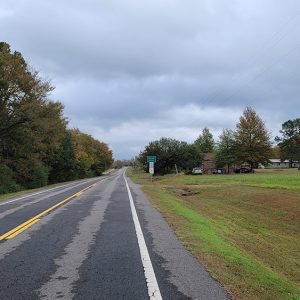 Entering Hector
Entering Hector 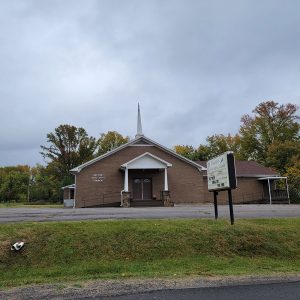 Hector Church
Hector Church 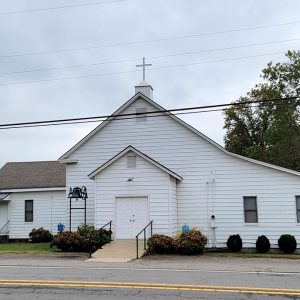 Hector Church
Hector Church 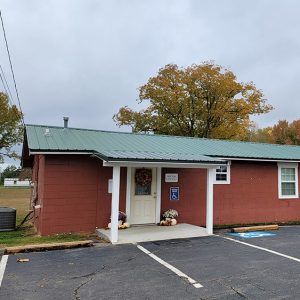 Hector City Hall
Hector City Hall 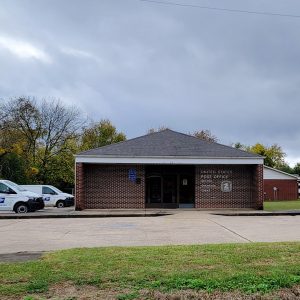 Hector Post Office
Hector Post Office 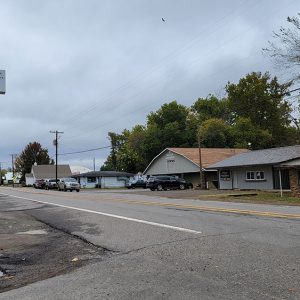 Hector Street Scene
Hector Street Scene 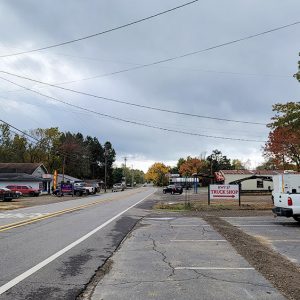 Hector Street Scene
Hector Street Scene 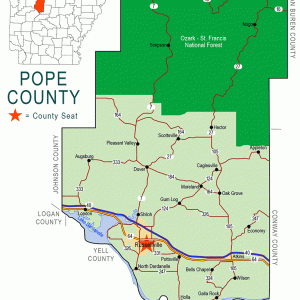 Pope County Map
Pope County Map 



Comments
No comments on this entry yet.